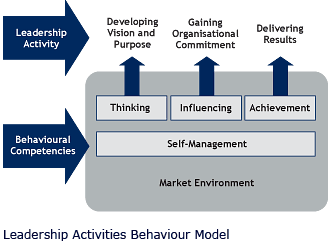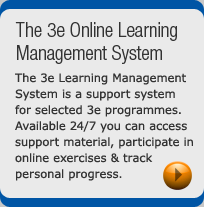The 3e Navigator for CEOs and Senior Executives
3E Performance have officially launched the ‘3e Navigator’ for CEOs and senior managing directors. Designed specifically for new CEO appointments the 3e Navigator is a step-by-step process to assist smooth migration... read more
Competency Modelling

Competencies are characteristic behaviours associated with strong and effective performance in organisational roles. They are actual, delivered behaviours. When such behaviours are delivered they result in good organisational outcomes. They are also the behaviours that distinguish superior performance from threshold performance. The Glowinkowski Integrated Framework™, a robust framework that is built on three decades of academic and organisational research and practices, which is at the heart of our interventions, have demonstrated that Leadership Behaviour is a key driver of an organisation’s climate, which is the pre-eminent determinant of performance.
From extensive research conducted by Dr Steve Glowinkowski during the 1980s/90s in which many hundreds of managers around the world were interviewed and asked to describe two recent achievement events in great detail, it has been identified and subsequently validated in numerous interventions in organisations that Leaders and Managers are generally immersed in three critical types of activities – Establishing Direction/Vision, Building Commitment and Delivering Outcomes. These correlate three broad clusters of behaviours – Thinking, Influencing through Relationships, Achievement. There is a fourth cluster of behaviour – Self-Management, which underpins the three others. Further more, all these activities and behaviours occur within the changing contextual dynamics of the organisational market-place. These are shown above.
These are the behaviours that are described as competencies for roles in organisations. It is now established that within the different behavior clusters – competencies – there are those that are fundamental, which the role holder must demonstrate, as a minimum, to deliver threshold performance. Then there are specific sets of competencies within each of the clusters which, if delivered by the role holder will result in superior levels of performance.
The Interventions
Organisations are assisted to develop unique competency profiles for their key executive roles. This is then used in a variety of ways once it is integrated into the organisations life and has become woven into its fabric, to drive key Talent Management processes like Role Profiling, Executive Resourcing, Succession Planning and Preparing Next Generation Leaders, Executive Coaching and Development.
Role Profiling
Given the established link between Organisational Climate, the pre-eminent determinant of performance and the way jobs are designed and integrated into organisation structures, it is essential that putting together a Job/Role profile is given serious thought. Competencies that are critical to performance need to be clearly laid out along side the technical knowledge, the experience, the skills required as well as the goals and objectives of the role.
Executive Resourcing
It is important, given the influence of leadership behaviour on performance and the huge cost of getting the resourcing of executive roles in an organisation wrong, to clearly articulate the required behaviour for successful performance in a role and to appraise an individual against this whether in an external recruitment situation or in an internal move. In a selection interview, the best means of identifying whether candidates deliver such behaviours is by conducting a Competency Based Interview. This goes beyond asking the usual questions like “What would you do if…” or “Tell me about a situation when you have…. A Competency Based Interview is an expert and process in which the interviewee is asked to describe at length two or three recent achievements. Their narrative is then reviewed and analysed for evidence of the required behaviours profiled in the competency model for the role being delivered. This style of interviewing has the highest predictive validity of all interviewing style.
Succession Planning and Preparing the Next Generation Leaders
Assessing the potentials of individuals for more senior roles in the organisation through identifying their strengths and development needs is a crucial responsibility for all organisational leaders. Not only does this help organisations in retaining their best people as well as maintaining a robust pipeline of talent thereby securing its future, it also contributes to an organisation becoming an employer of choice. It is important that this crucial activity is performed on the basis of good and relevant facts. It will be inappropriate to base a decision to promote a person from say a sales position only on his/her delivery track record if the role he is being promoted to is one where he/she is required to achieve results through others. The behaviours that are required in a role that is built around achieving results through others are very different from those that probably produced the solo salesperson’s tack-record so far. By the same token the behaviours required for success as a CEO are much more than the behaviours that guaranteed success as a business unit or functional executive.
It is in this regards that a well designed Competency profile is indispensable. We support line managers as well as equip HR in the business to facilitate this key People Development Process through identifying those behaviours that are critical for success in current roles as well as for other more senior roles or peer roles in an organisation, to ensure that people are moved into roles where they stand the most chance of success, playing to their strengths and developing strength in areas where needs have been identified as they prepare for more senior and complex roles in the organisation. We help organisations to answer the strategic question “Now that those that delivered today’s result are in place, who will deliver tomorrows results and how do we enable them to be ready?”





